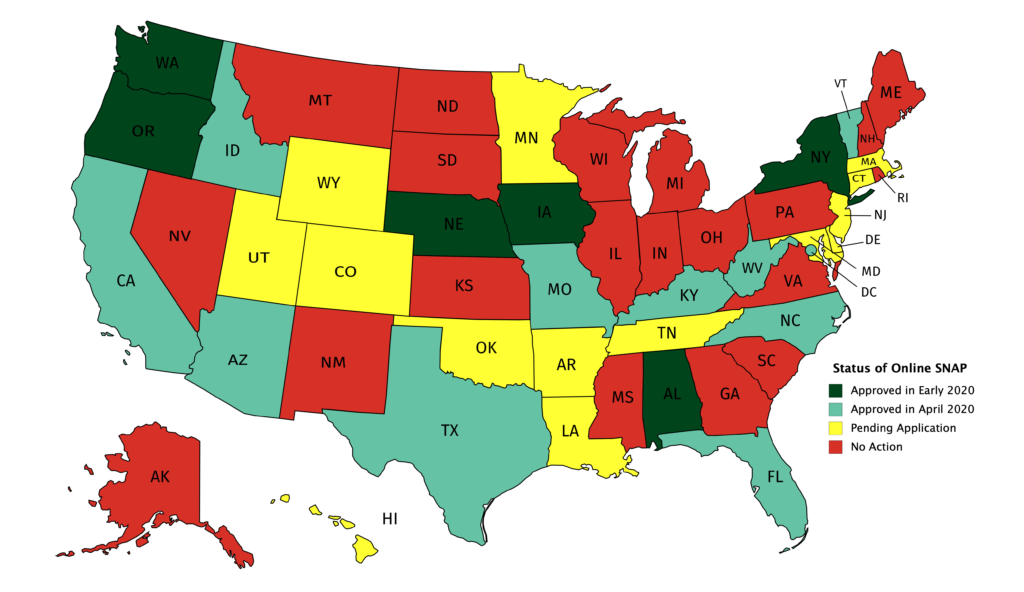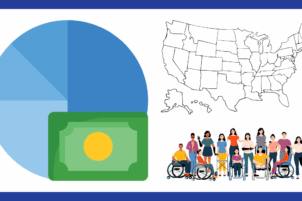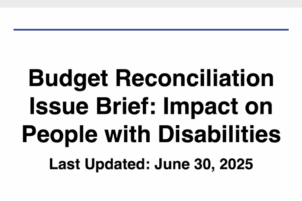In 16 states, people with disabilities now can use SNAP to eat safely while other states leave people with disabilities at risk
Washington, D.C., May 1 – In 16 states, people with disabilities and other recipients of the Supplemental Nutrition Assistance Program (SNAP) no longer have to choose between risking exposure to COVID-19 or getting food from the grocery store. Thanks to an administrative change, millions of Americans now can access online grocery deliveries through Amazon Fresh and Walmart.
Because of the COVID-19 pandemic, a simple action like going to the grocery store to put food on the table means potentially risking exposure to the coronavirus. This is especially the case for those who are blind or use wheelchairs or other mobility devices for whom maintaining six feet of distance may be impossible. The answer for many American households has been to turn to online grocery deliveries. For many of the 11 million Americans with disabilities who rely on SNAP for their basic nutrition, however, that option has been unavailable, leaving them to shop in person despite the higher risk they face.
“This is an urgent need in the disability community,” said Jennifer Laszlo Mizrahi, President and CEO of RespectAbility, a nonprofit disability organization that has actively reached out to the directors of SNAP programs in each state on this issue. “We have heard this in virtual gatherings we’ve hosted with people across the country. People with disabilities who use SNAP and who are uniquely at risk during this pandemic need to be able to eat. We have reached out to every state on this issue, encouraging SNAP directors to urgently enable people to use SNAP for online groceries and delivery. We are grateful for progress. But more must be urgently done before more lives are lost.”
This victory for people with disabilities is directly attributable to the advocacy of hunger organizations and disability rights groups, including the Consortium of Citizens with Disabilities (CCD), RespectAbility, the National Disability Rights Network (NDRN) and others. These organizations collaborated to release public advocacy letters to Congress, distribute advocacy materials to federal leaders, and educate state leaders about taking action on this life-or-death issue.
The CDC reports that approximately 90 percent of people hospitalized with COVID-19 have underlying conditions. This means that in addition to the higher risk of exposure mentioned above, people with disabilities and other historically marginalized communities, the groups most likely to have these conditions, are among the most at risk for severe complications from the coronavirus if they catch it.
At the same time, with jobless claims soaring past 30 million, people with and without disabilities have lost their jobs and must turn to social safety net programs like SNAP to survive. Formerly and informally known as Food Stamps, SNAP is managed by the U.S. Department of Agriculture (USDA) and helps far more than just people with disabilities including nearly 20 million children, almost 5 million seniors, and about 11 million people with disabilities.
In 2014, the USDA launched a pilot program to allow SNAP beneficiaries in six states – Alabama, Iowa, Nebraska, New York, Oregon and Washington State – to order groceries online to be delivered to their door. Working with Amazon Fresh and Walmart, the pilot program rolled out earlier this year.
In response to the unprecedented needs created by the pandemic, 11 more jurisdictions joined the pilot program in April: Arizona, California, Florida, Idaho, Kentucky, Missouri, North Carolina, Texas, West Virginia and Vermont, as well as the District of Columbia. An additional 14 states have applied to join the pilot: Arkansas, Colorado, Connecticut, Delaware, Hawaii, Louisiana, Maryland, Massachusetts, Minnesota, New Jersey, Oklahoma, Tennessee, Utah and Wyoming.

Related Resources
- For more information about advocacy efforts to push more states to join the SNAP Online Purchasing Pilot, follow RespectAbility’s real-time advocacy efforts online at https://www.respectability.org/covid-19 or make use of the extensive resources collected by the Arc: https://thearc.org/covid.
- To learn more about accessing critical safety net or economic assistance programs, please visit RespectAbility’s COVID-19 Economic Benefits How-To Guide: https://www.respectability.org/2020/04/covid19-economic-benefits-guide.
- For more information about the SNAP program and how it serves people with disabilities, visit the website of the Food Research and Action Center (FRAC): https://frac.org/blog/snap-matters-people-disabilities.
- For a list of SNAP directors by state, visit the AASD website: https://aphsa.org/AASD/AASD/AASD_Leadership.aspx







